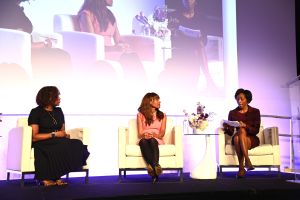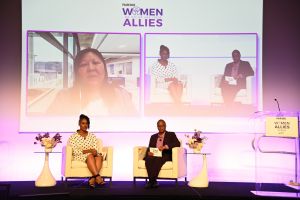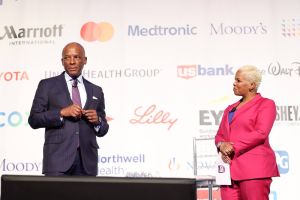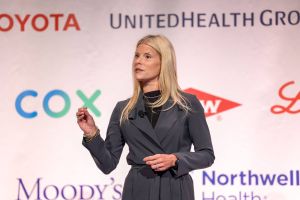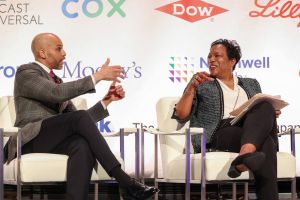The following session is from Fair360, formerly DiversityInc’s fourth annual Women of Color and Their Allies event, held Oct. 21, 2021. This year’s theme was “Sustaining Workforce Positions for Women of Color.” Throughout the day, panels consisting of researchers, thought leaders and executives shared their insights and strategies for helping women of color overcome common workplace barriers and spotlight allies working to sustain their positions within the workforce.
Moderator: Lissiah Hundley, Head of Strategic Partnerships and Client Fulfillment at Fair360, formerly DiversityInc
Panelists:
- Senta Taylor, Senior Vice President and Head of U.S. Credit Card and Unsecured Lending at TD Bank (No. 14 on The Fair360, formerly DiversityInc Top 50 Companies for Diversity list in 2021)
- Karen Pavlin, North America Inclusion and Diversity Leader at Accenture (No. 2 in 2021)
- Malini Moorthy, Vice President and Chief Deputy General Counsel at Medtronic (No. 11 in 2021)
- Rolddy Leyva, Managing Vice President at Capital One Financial (No. 28 in 2021)
Microaggressions are subtle intentional and unintentional acts such as comments or gestures that tend to be rooted in implicit or explicit racism, sexism or homophobia.
During this roundtable dialogue, you’ll discover the microaggressions you may use in your daily life; learn how to recognize and eliminate them, and learn ways to promote a microaggression-free environment in your workplace.
Several top industry leaders will discuss different types of bias in the workplace and how leaders can increase personal-bias awareness, eliminate common microaggressions, and address them. Plus, learn about the concept of intent versus impact and how it relates to equality, equity and liberation, as well as tools you can make available to help reduce bias and create a more inclusive work environment.
Session Highlights
“This is just such an important and timely topic, because particularly of late the whole space of diversity, equity and belonging has become highly politicized and polarized. It detracts from the goodness and the importance of the work. On one end, you end up where the space is labeled as too politically correct. On the other end, we have woke mentality and cancel culture and its paralyzing effect on people, specifically in the workplace on people and leaders who otherwise are genuinely attempting to engage in this work. I think both of these extremes are counterproductive. It serves to further divide people and derail the intent of this work. Which is, again, ultimately about building equity and belonging.” — Rolddy Leyva
“Bias can be expressed in humor, and people think that they’re joking, but they’re not. So we need to believe our colleagues and coworkers and really understand that these comments made in jest have real effects. Words and tone, the way you say something, can have an effect on a person. It’s really important to know that there’s an emotional cost for dealing with microaggressions and that every person has a way of dealing with it differently. Some people may be able to brush it off, and a lot of people take it to heart.” — Karen Pavlin
“One of the things I ask myself as a leader all the time is, am I creating an environment where people are comfortable telling me what I don’t want to hear? That’s hard, but you’ve got to have that culture so that, at the moment, someone can do it and challenge you. I think it’s really being self-aware because you can catch yourself as you’re saying something. It’s very powerful, especially for a leader to catch themselves, be vulnerable, and then acknowledge, apologize and say, ‘look, I’m continuing to learn.’ You will move and drive and push forward so much just by those actions with that group of people.” — Malini Moorthy
“Last year, the candid conversations were one of the biggest things that I felt had a huge impact on the culture. Because I felt for the first time ever, people started to talk about things that they wouldn’t talk about otherwise. They really started to share things. It was okay to be vulnerable, okay to share some things about who people really are. I never realized how much of ourselves we left at home or the door when we came into work.” — Senta Taylor


